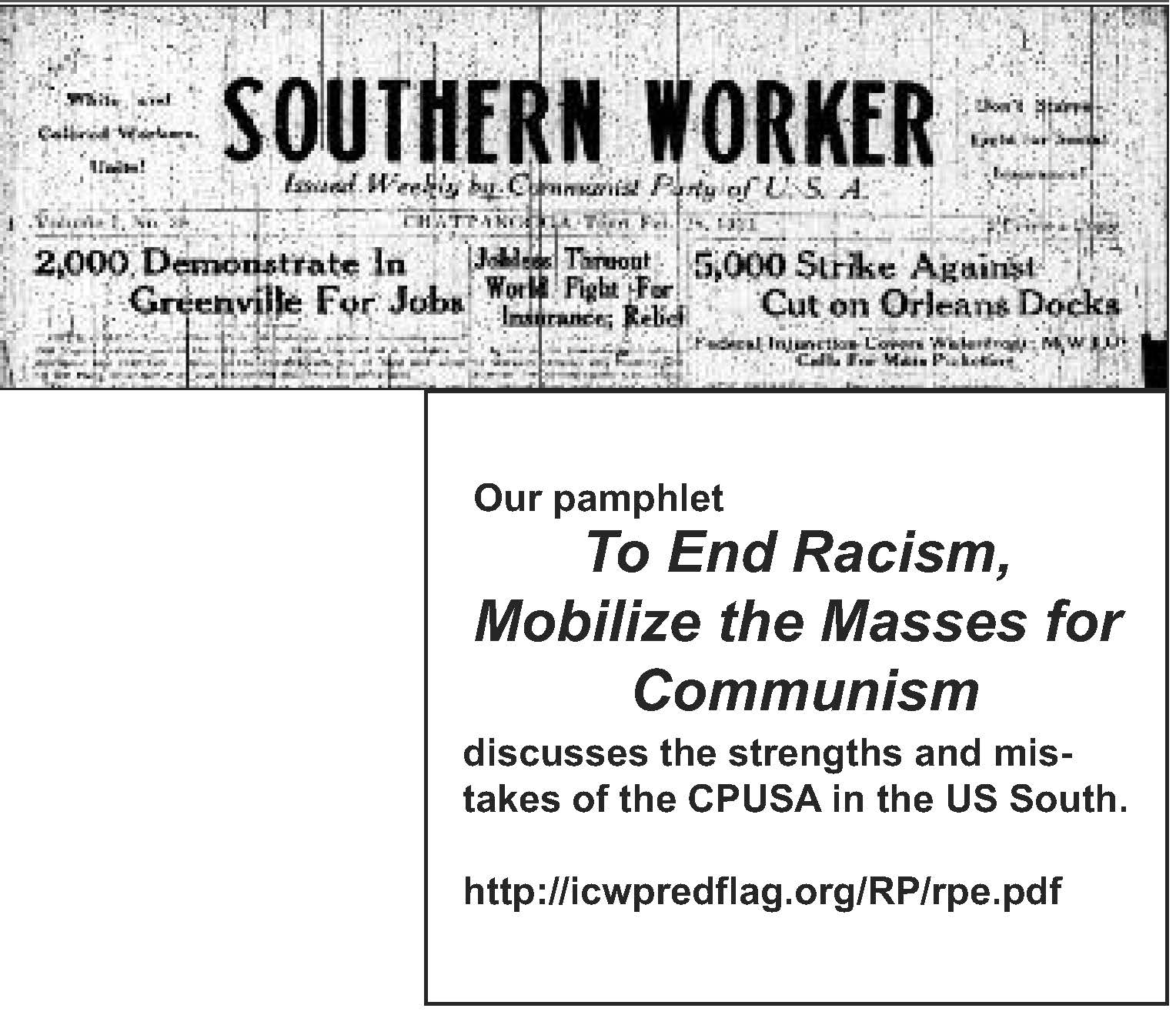
 |
FIGHT FOR COMMUNISM! |
International Communist Workers Party | |
LETTERS, CRITICISM AND SUGGESTIONS
Fighting Racism by Mobilizing for Communism in the US South

Racism and exploitation are intensifying along with the bosses’ crisis. We need more communist activity. But how do we motivate comrades and friends to mobilize for communism under harsher conditions?
My wife and I recently spent a day with a comrade in South Carolina. He knew about racist exploitation. It was in his face and, quite frankly, somewhat intimidating.
For example, one firm hired only white truck drivers to ferry Latino workers to the construction worksites. Undocumented workers could not get licenses.
The boss said that “he knew the drivers were racist, but he needed licensed drivers.” The next day he held a meeting to yell at the drivers. He didn’t want them to stop to let workers pick up some coffee in the pre-dawn hours. Just who is building racism and increasing exploitation!
Other Latino/a workers picked the fall crops. Some weren’t even scraping by.
At first we suggested some modest ways for him to distribute the party’s anti-racism pamphlet and Red Flag. He was justifiably afraid of losing his job—or worse.
“I’ve read in the paper that the capitalists created racism,” he said, while serving a delicious lunch that he had cooked for us. So blaming capitalism wasn’t the issue.
Then we got to talking about the material basis of racism and how communism offers the opportunity to eliminate it. The conversation became more serious.
We read in the party’s pamphlet some of the history of how communists in the past fought racism. We learned from their strengths and mistakes. He read the global leaflet about the immigration crisis on the ICWP website.
We spent the rest of the day strolling through the town. The more we talked, the more we collectively understood what eliminating the wage system meant. It allows us to put an end to all aspects of racism.
By the end of the day, he was more enthusiastic about waging the struggle. He gave us a large sum of money (for him) to pay for the papers we’ve sent him and to continue sending them.
He could work out the tactics; what he needed was a communist vision.
—Industrial Comrade
They oppress. We protest. They police.
We create history. They write textbooks. We go to their schools.
They call us enemies. We fight with ourselves. They televise our fight.
We die. They write news. We buy their newspapers.
They tell us what to speak. We speak their language. They dictate our thoughts.
We make art. They market it. We see art becoming cash.
They invent psychiatry. We become depressed. They make drugs.
We labour. They profit. We get wages.
They pollute the earth. We catch diseases.
They become ministers. We serve them.
They make laws. We get arrested. They chair courts.
We grow food. They belch with full stomachs. We starve.
They sell bombs. We die in wars. They celebrate patriotism.
We question. They give us God. We pray for answers.
We are wage slaves, they profit from us.
We have the power to change, they don’t.
Reader in India
Talking with Bus Drivers in Los Angeles
“No thanks,” said a bus operator who sometimes reads Red Flag, when offered the latest issue.
“Did you watch the debate last night?” asked a comrade.
“Yes,” he said. That set him off on a rant that ended: “They are both out for themselves. Who is standing up for us?”
“Nobody,” replied the comrade. “That’s why you need this paper.”
The worker smiled, gave a “thumbs-up” and took Red Flag.
—-a comrade
“Here is our pamphlet To End Racism: Mobilize The Masses For Communism,” said a Red Flag distributor to an MTA operator at Division 18.
“I would definitely like to see an end to racism,” answered the operator.
“Well, for that we would have to destroy capitalism. Racism was born with capitalism. Prior to capitalism there was no racism. Roman slavery was not based on the color of a person’s skin.”
“Yes, it was a social class question,” said the operator.
“Yes, those defeated in war were made slaves. The Roman Empire had German, French, English, Greek and many other people enslaved. Early capitalism began by enslaving the darker- skinned indigenous people in the Americas. When these were exterminated from disease and hard work, like in the Caribbean islands, they hunted Africans and brought them to the Americas as slaves. Racist ideology was then developed to justify slavery based on skin color. This racism is now used worldwide to super-exploit darker-skinned workers.
“To get rid of racism we must destroy wage slavery, the material basis of racism and the source of the capitalists’ profits. It plays a crucial role in maximizing profits by paying some workers less than others. In the US, this means super-profits from the super-exploitation of black and latin workers. This racist ideology also divides the working class, preventing us from uniting to overthrow capitalism with a communist revolution.”
“I guess you are right. To end racism we must end capitalism,” agreed the operator.
“And get rid of money!” shouted the Red Flag distributor as the driver drove off.
“Definitely!” answered back the operator.
“That is exactly what I was thinking while on the bus. That will be the only way to end racism,” said a Division 13 operator when approached in the same manner.
“And we will have to get rid of money. Keeping money and wages was the downfall of the Russian and Chinese revolutions. A communist revolution will eliminate money,” said the Red Flag distributor.
“Yes, then we will all be equal. No rich no poor,” agreed the operator taking Red Flag as he walked toward the entrance.
—LA comrade
Unity and Struggle
It was great to read about the dialectical materialism school. In fact just reading about it reminded me that there are two (not one) strategies for winning new people to the ICWP. You could call them the “negative” and the “positive” strategies
In the report on the school it says at one point “to be able to recruit someone else, we have to understand their internal contradictions that hold them back.”
This seems like basic common sense: find out what’s holding them back and negate it (overcome it). (This is the “negative” strategy.) Clearly, this is the first thing we should try. It works fine if, for example, a simple misunderstanding is stopping them. Maybe they think that joining means turning your back on friends and family. We explain that the opposite is the case and problem solved.
However, if their objections are deeper the negation strategy is not so quick and easy and, more importantly, may not give the result we want.
This struggle could take a while but suppose we win. Our friend may say only, “Ok, I might as well join”. Which is a step forward, but short of what we need – enthusiasm.
We’ve mistakenly applied a law of mechanical change, namely that two negatives is a positive. It may be true in arithmetic that - - 1 is +1 but it is not true in real life.
The other strategy is to look at the other sides of our friend’s internal contradictions: the forces that are pushing her to join the party. We try to find communist ideas and actions that we can unite on and that can generate enthusiasm in our friend. This is the positive strategy.
For example, it’s obvious from reading Red Flag that many workers are fascinated by dialectical (and historical) materialism. We can encourage our friend to get involved in discussions and events like the recent school. These experiences may lead her to, on her own, rethink some of her (say) anticommunist prejudices.
In other words, we concentrate primarily on reinforcing her strengths rather than combating her weaknesses.
The positive strategy requires patience and restraint on our part. We have to avoid latching on to minor disagreements and making major issues out of them. For example, suppose that a friend is very keen on mayday but occasionally smokes marijuana. We should make our position on drugs clear but not nag him about it. Similarly, if he wants to vote for Clinton we can explain (once) that this is a waste of time and leave it at that.
Often when following the positive strategy their growing enthusiasm for communism leads them on their own to question and reject their negative ideas.
—Northern Comrade
